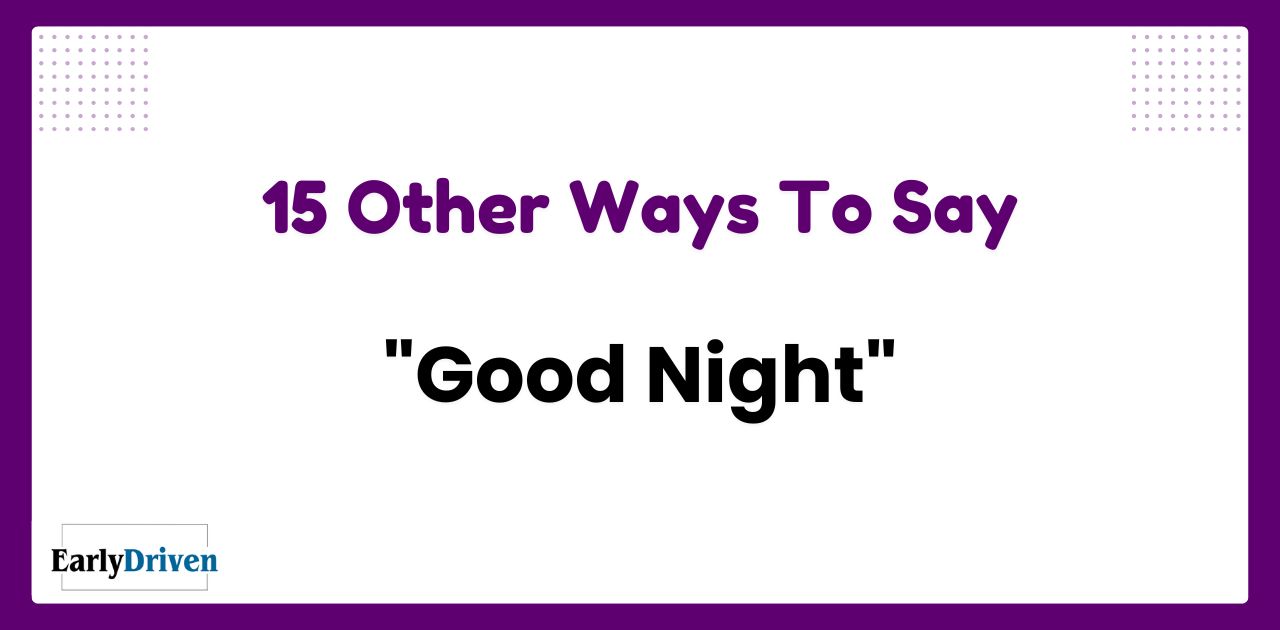Understanding the Purpose of Ways to Say “Good Night”
In our daily interactions, the way we bid farewell at day’s end carries significant weight in maintaining and nurturing relationships. While “good night” serves as a traditional evening farewell, having a diverse repertoire of nighttime salutations can enhance personal connections and add warmth to our daily conversations.
The art of saying good night extends beyond mere courtesy—it represents a moment of connection, offering comfort and expressing care before rest. Whether communicating with family members, close friends, or romantic partners, choosing the right phrase can meaningfully impact our relationships.
Other Ways to Say “Good Night”
- Rest well
- Sleep tight
- Sleep well
- Sweet dreams
- Until tomorrow
- Nighty night
- Catch some Z’s
- Dream of me
- Time to hit the hay
- See you in the morning
- Have a peaceful sleep
- Rest easy
- Don’t let the bedbugs bite
- May your dreams be pleasant
- Lights out
1. Rest Well
“Rest well” conveys a sophisticated blend of care and professionalism. This phrase acknowledges the importance of restorative sleep while maintaining appropriate boundaries in various relationships.
Example: “After such a productive day, rest well—you’ve certainly earned it. I look forward to our collaboration tomorrow.”
2. Sleep Tight
The phrase “sleep tight” carries a nurturing tone, perfect for intimate family settings or close friendships. This traditional expression has endured through generations, offering comfort and warmth.
Example: “Thanks for a wonderful evening. Sleep tight, and I’ll see you at tomorrow’s breakfast meeting.”
3. Sleep Well
“Sleep well” serves as a versatile expression suitable for both personal and professional contexts. It demonstrates genuine consideration for someone’s well-being without overstepping boundaries.
Example: “I appreciate your hard work today. Sleep well, and let’s tackle those challenges fresh in the morning.”
4. Sweet Dreams
“Sweet dreams” embodies tenderness and affection, making it particularly suitable for close relationships. This heartfelt expression goes beyond simply acknowledging bedtime—it actively wishes for pleasant subconscious hours.
Example: “Thank you for sharing your concerns today. Sweet dreams, and remember that tomorrow brings fresh perspectives.”
5. Until Tomorrow
“Until tomorrow” carries an optimistic tone, emphasizing continuity in relationships and future interactions. This phrase works exceptionally well in professional settings while maintaining a personal touch.
Example: “We’ve made excellent progress on the project today. Until tomorrow—I look forward to building on this momentum.”
Read Also: 15 Other Ways to Say “Happy Birthday”
6. Nighty Night
While more casual, “nighty night” adds a playful element to evening farewells, particularly appropriate among close friends or family members. This phrase creates a lighthearted atmosphere before bedtime.
Example: “Great catching up over dinner. Nighty night—let’s plan another evening together soon.”
7. Catch Some Z’s
This informal expression “catch some Z’s” brings a modern, relaxed feel to nighttime partings. It’s particularly effective in casual settings or when lightening the mood after a long day.
Example: “You’ve been working intensely all day. Time to catch some Z’s and recharge those creative batteries.”
8. Dream of Me
“Dream of me” carries romantic undertones, making it ideal for intimate relationships. This phrase creates a lasting connection that bridges the hours of separation.
Example: “As this wonderful evening comes to a close, dream of me, and I’ll see you in the morning light.”
9. Time to Hit the Hay
The idiomatic expression “time to hit the hay” adds a rustic charm to evening farewells. This phrase maintains a friendly tone while clearly signaling the day’s end.
Example: “The presentation is ready for tomorrow. Time to hit the hay and approach it with fresh energy.”
10. See You in the Morning
“See you in the morning” combines practicality with optimism. It works particularly well in situations where continuity is important, such as business trips or family gatherings.
Example: “The conference agenda is set. See you in the morning for the opening keynote.”
11. Have a Peaceful Sleep
“Have a peaceful sleep” extends beyond basic courtesy to wish true tranquility for the recipient. This phrase shows deeper consideration for someone’s rest and recovery.
Example: “I know today’s meetings were challenging. Have a peaceful sleep—tomorrow is another opportunity.”
12. Rest Easy
“Rest easy” offers reassurance and comfort, particularly effective after discussing concerns or completing important tasks. It acknowledges both physical and mental aspects of rest.
Example: “Everything is prepared for tomorrow’s presentation. Rest easy—you’re more than ready.”
13. Don’t Let the Bedbugs Bite
This playful phrase “don’t let the bedbugs bite” adds levity to nighttime farewells while maintaining an element of caring. It’s particularly effective in family settings or long-standing friendships.
Example: “Thanks for the lovely evening chat. Sweet dreams, and don’t let the bedbugs bite!”
14. May Your Dreams Be Pleasant
“May your dreams be pleasant” offers a formal yet warm way to wish someone good night. This phrase carries a touch of elegance while expressing genuine good wishes.
Example: “As we conclude this productive day, may your dreams be pleasant and inspiring.”
15. Lights Out
“Lights out” provides a clear, decisive way to mark the day’s end. While originally military in nature, it has evolved into a broader phrase suitable for various contexts.
Example: “Great work on the project today, team. Lights out—let’s reconvene refreshed tomorrow.”
Best Practices for Evening Farewells
- Consider the relationship context when choosing your phrase
- Match your tone to the situation and setting
- Be mindful of cultural differences in evening greetings
- Maintain consistency in professional settings
- Add personal touches when appropriate
Common Scenarios and Applications
- Professional Settings:
- Team meetings ending late
- Business travel arrangements
- Remote work collaboration across time zones
- Personal Relationships:
- Family gatherings
- Long-distance relationships
- Close friendships
- Digital Communication:
- Virtual meetings
- Messaging platforms
- Social media interactions
FAQ’s
Q: When is it appropriate to use more casual good night expressions?
A: Casual expressions work best with close friends, family, or in relaxed work environments where such informality is established.
Q: How can I make my evening farewells more meaningful?
A: Add personal touches referring to shared experiences or upcoming events, showing you value the relationship.
Q: Should I vary my good night phrases?
A: Yes, varying your expressions helps maintain authenticity and prevents communications from feeling routine.
Q: What are some alternatives to saying “good night”?
A: Beyond the traditional “good night,” you can use expressions like “sleep well,” “rest easy,” “sweet dreams,” or “until tomorrow.” Each alternative carries its own nuance and is suitable for different relationships and contexts.
Q: How can I say goodnight in a unique way?
A: Create unique good night messages by combining traditional phrases with personal touches, such as “rest peacefully under the stars” or “may tomorrow bring you joy.” Consider incorporating shared experiences or inside references to make the message more meaningful.
Q: What’s the best way to say goodnight professionally?
A: Professional good night messages should maintain appropriate boundaries while expressing courtesy. Options like “rest well,” “have a peaceful evening,” or “until tomorrow” work well in business settings as they convey respect without becoming overly personal.
Q: How do you say goodnight without sounding overly casual?
A: Choose more formal expressions like “have a pleasant evening,” “wishing you a restful night,” or “may your night be peaceful.” These phrases maintain professionalism while still conveying warmth.
Q: What is a sweet but appropriate way to say goodnight to friends?
A: For friends, you can use warm expressions like “sweet dreams, dear friend,” “rest well and wake up wonderful,” or “looking forward to tomorrow.” These phrases show care while maintaining appropriate boundaries.
Q: How do you wish someone a unique good night?
A: Craft personalized messages by referencing shared moments or future plans, such as “dream about our upcoming adventure” or “rest well, and let’s continue our conversation tomorrow.” This approach makes the farewell more meaningful and memorable.
Q: Is there a difference between formal and casual good night expressions?
A: Yes, formal expressions like “have a peaceful evening” are better suited for professional settings, while casual phrases like “nighty night” or “catch some Z’s” are more appropriate for close friends and family.
Conclusion
The art of saying good night encompasses more than mere evening farewells—it represents an opportunity to strengthen bonds and express care. By thoughtfully selecting from these alternatives to “good night,” we can enhance our relationships and create meaningful moments of connection before rest. Remember that the most effective nighttime wishes align with the relationship’s nature and the situation’s context, making each farewell a genuine expression of consideration for others’ well-being.
Whether in professional or personal settings, these varied expressions allow us to end our days on positive notes while maintaining appropriate boundaries and showing authentic care for those in our lives. As we embrace these diverse ways of bidding farewell at day’s end, we contribute to stronger, more nuanced relationships and more meaningful interactions in our daily lives.
Elevate you English Learning Skills with our Mastery Blogs!

“Smith, At EarlyDriven, our dedicated team of experienced writers and journalists brings you comprehensive coverage across entertainment, celebrity news, and educational content. With expertise in digital media and a commitment to accuracy, we craft engaging stories that inform, educate, and entertain our global readership.










